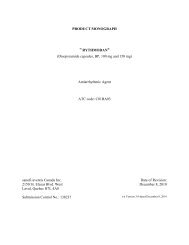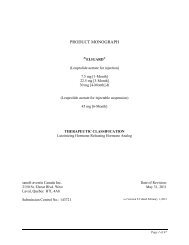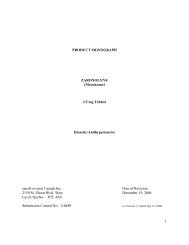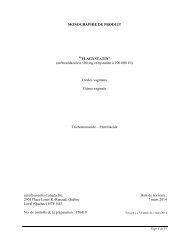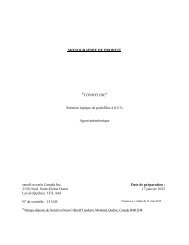Apidra (insulin glulisine) - Sanofi Canada
Apidra (insulin glulisine) - Sanofi Canada
Apidra (insulin glulisine) - Sanofi Canada
You also want an ePaper? Increase the reach of your titles
YUMPU automatically turns print PDFs into web optimized ePapers that Google loves.
INTERACTIONS WITH THIS MEDICATION<br />
Other medicines, including non-prescription<br />
medicines, and dietary supplements (such as<br />
vitamins) can change the way <strong>insulin</strong> works. Your<br />
dose of <strong>insulin</strong> or other medications may need to be<br />
changed in consultation with your healthcare<br />
professional. Please see “Proper use of medication”<br />
section below for potential medication interactions<br />
with <strong>insulin</strong>.<br />
PROPER USE OF THIS MEDICATION<br />
Dosage:<br />
The dosage of APIDRA should be individualized and<br />
determined based on your health professional’s<br />
advice in accordance with your needs.<br />
APIDRA should be given by subcutaneous injection<br />
within 15 minutes before a meal or within 20 minutes<br />
after starting a meal. It can also be used in an<br />
external <strong>insulin</strong> pump for continuous subcutaneous<br />
<strong>insulin</strong> infusion (CSII).<br />
Many factors may affect your usual APIDRA dose,<br />
which may include changes in your diet, activity, or<br />
work schedule. Follow your health professional’s<br />
instructions carefully. Consult your health<br />
professional if you notice your <strong>insulin</strong> requirements<br />
changing markedly. Other factors that may affect<br />
your dose of <strong>insulin</strong> or your need to do additional<br />
blood/urine testing are:<br />
Illness<br />
Illness, especially with nausea and vomiting, diarrhea<br />
and/or fever, may change how much <strong>insulin</strong> you<br />
need. Even if you are not eating, you will still require<br />
<strong>insulin</strong>. You and your health professional should<br />
establish a sick day plan for you to use in case of<br />
illness. When you are sick, test your blood/urine<br />
frequently and call your health professional as<br />
instructed.<br />
Pregnancy<br />
If you are planning to have a baby, are pregnant, or<br />
are nursing a baby, consult your health professional.<br />
Good control of diabetes is especially important for<br />
you and your unborn baby. Pregnancy may make<br />
managing your diabetes more difficult.<br />
IMPORTANT: PLEASE READ<br />
Medication<br />
Always discuss any medications you are taking,<br />
prescription or “over-the-counter”, with your health<br />
professional. To prevent drug interactions, volunteer<br />
the names of everything you are taking even before<br />
they ask if there have been any changes. Insulin<br />
requirements may be increased in the presence of<br />
drugs with hyperglycemic activity, such as<br />
contraceptives (for example, birth control pills,<br />
injections and patches) and hormone replacement<br />
therapies, corticosteroids, thyroid replacement<br />
therapy, and sympathomimetic agents such as<br />
decongestants and diet pills. Insulin requirements<br />
may be reduced in the presence of drugs with<br />
hypoglycemic activity, such as oral antidiabetic<br />
agents, salicylates (for example, aspirin), sulfa<br />
antibiotics, blood pressure medications including<br />
ACE inhibitors, and certain psychiatric medications<br />
including MAO inhibitors or antidepressants and<br />
anti-anxiety medications.<br />
Substances including beta-blockers, used for<br />
conditions including blood pressure, heart<br />
arrhythmias, palpitations and headache, and alcohol<br />
may enhance or weaken the blood-glucose-lowering<br />
effect of <strong>insulin</strong>s, and signs of hypoglycemia may be<br />
reduced or absent.<br />
Exercise<br />
If your exercise routine changes, discuss with your<br />
health professional the possible need to adjust your<br />
<strong>insulin</strong> regimen. Exercise may lower your body's<br />
need for <strong>insulin</strong> during and for some time after the<br />
activity. As for all <strong>insulin</strong>s, the rate of absorption,<br />
and consequently the onset and duration of action,<br />
may be affected by exercise and other variables.<br />
Travel<br />
Consult your health professional concerning possible<br />
adjustments in your <strong>insulin</strong> schedule if you will be<br />
traveling across time zones. You may want to take<br />
along extra <strong>insulin</strong> and supplies whenever you travel.<br />
Missed dose:<br />
If you have missed a dose of APIDRA or if you<br />
have not injected enough <strong>insulin</strong>, your blood sugar<br />
level may become too high (hyperglycemia). Check<br />
your blood sugar frequently. For information on the<br />
treatment of hyperglycemia, see “Side Effects and<br />
What To Do About Them” below.<br />
Page 41 of 61



